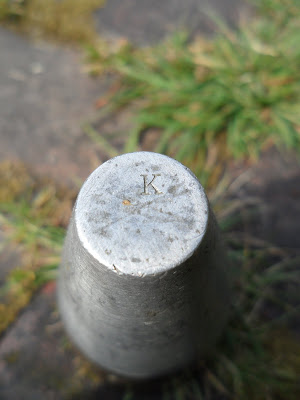This last weekend I stopped off at our local used building supply store and happened to notice an artillery fuze sitting on the "miscellaneous for sale" counter! It cost me the loose change in my pocket...... a true and unique bargain! For those of you wondering what an artillery fuze is......... it is the "nose" of an artillery shell that determines how the shell will be detonated. Some fuzes are set to go off on impact, some are mechanically or electrically timed and some can sense the proximity of items like aircraft, causing the round to detonate. There are literally thousands of types of fuzes, all made for different rounds and for different purposes.
 |
| A modern 155mm shell being fitted with a fuse. |
UPDATE 10/29/2019: It appears that this fuse is from The USA. It is from WW2, and was used on Antiaircraft shells. It was a mechanical, time-delay fuse, designated M43A3 Mechanical Time Fuze. It was a standard use fuse for 3-inch, 90 mm, and 105 mm antiaircraft shells.
http://bulletpicker.com/mt_-m43a4.html
There are several small, steel screws around the base that push against an inner steel, circular snap ring-wire. The screws and snap ring-wire are rusted and corroded and this gives me the impression that this fuze is not modern. I believe that this snap ring-wire is what secures this fuze to the artillery round.
Inside the brass base, you can see three, small, threaded holes with bright threads and a "ghost outline" where something was removed more recently. I am guessing that it was some sort of electrical timer..... but that is just a guess. The fuze is not a mechanical one as it is not geared with calibration and timing marks around the outside............. that leaves electrical as the next best guess.
The aluminum end cap is threaded into the brass base and it appears to be fixed in place by peening the aluminum in the detents where the aluminum and brass base meet.
Here are the dimensions of the fuze:
55 mm total width
13 mm across the nose flat
37 mm height of brass base
43 mm height of aluminum nose piece
If anyone has any idea of what kind of fuze this is, nationality or age, please leave a comment or drop me an email.
Here are some more photos of the fuze:
 |
| Damage on one side.... |









No comments:
Post a Comment